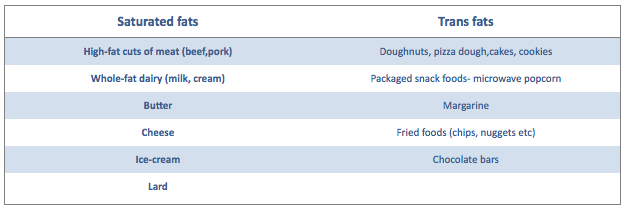Fats have long been preached as a food to limit – “a low-fat diet is key to losing weight, controlling cholesterol and preventing health problems”. In reality its more than just how much fat you consume it’s the type of fat that really matters!
Bad fats increase cholesterol and your risk of certain diseases, while good fats protect your heart and support overall health – good fats like omega-3 fats are essential to physical and emotional health.
Do you look for low-fat labelled foods, search for the “guilt-free” ice-creams, cookies etc in the supermarket?
Food suppliers have fed our need for these items, further solidifying the mentality that low-fat means the healthier option that will deliver the desired trim physique but do they really deliver?
Despite this hype “all fats are not equal” – bad fats such as saturated and trans fats are the guilty parties contributing to the wider waistlines, clogged arteries etc. Many fat-free foods are high in sugar, refined carbohydrates, and calories.
The good fats, such as monounsaturated or polyunsaturated (including omega 3 and omega 6) have the opposite effect playing a vital role in weight control, hormonal regulation and providing energy.
The key is to reduce our overall fat consumption while optimising its content – don’t cut fat out but make healthy choices and substitute bad fats with good fats to promote health and overall well-being!
Knowledge is power
Knowing about the different types of fats and being able to identify them is the first step to a healthy diet! There are four major types of fats:
- monounsaturated fats (good fats)
- polyunsaturated fats (good fats)
- trans fats (bad fats)
- saturated fats (bad fats)
Monounsaturated fats and polyunsaturated fats are known as the “good fats” because they are good for your heart, your cholesterol, and your overall health.

Saturated fats and trans fats are known as the “bad fats” because they increase your risk of disease and elevate cholesterol. Saturated fats and trans fats tend to be solid at room temperature (e.g. butter), while monounsaturated and polyunsaturated fats tend to be liquid (e.g. olive oil)

Tips for fat consumption in your diet
- Try to eliminate trans fats from your diet – limit fast food
- Limit your intake of saturated fats – reduce red meat and full-fat dairy foods, try replacing red meat with beans, nuts, poultry, and fish whenever possible, and switching from whole milk and other full-fat dairy foods to lower fat versions.
- Eat omega-3 fats every day. Sources include fish, walnuts and flaxseed oil.
- Remember No amount of trans fats is healthy. Trans fats contribute to major health problems, from heart disease to cancer.
- When shopping read the labels even if products claim to be trans of fat free. Be wary of partially hydrogenated oil on labels (trans fat).
- When eating out avoid fried foods, ask the server what oils your food is prepared in
- At home use olive oil instead of butters/fats/margarines.
- Eat more avocados – as a simple guacamole or perfect with eggs, they are loaded with heart and brain-healthy fats!
- Snack on olives – perfect on their own as a low-calorie snack or as a tapenade for dinner.
- Make your own salad dressings for a healthier option with high quality olive oil
- Go nuts – add nuts to your diet either as a snack or grind up to use as breadcrumbs on fish or chicken instead of bread!
The bottom line
- Eat a reasonable amount of fat every day to stay healthy; too many people consume too much “bad fats” and too few essential fats.
- Reduce intake of saturated fats to improve cardiovascular health – replace with good fats not refined carbs!
- Cutting calories is the key to weight loss; fats are filling and can help curb overeating.
The bottom line is don’t say no to fat just make sure you say yes to good fats!